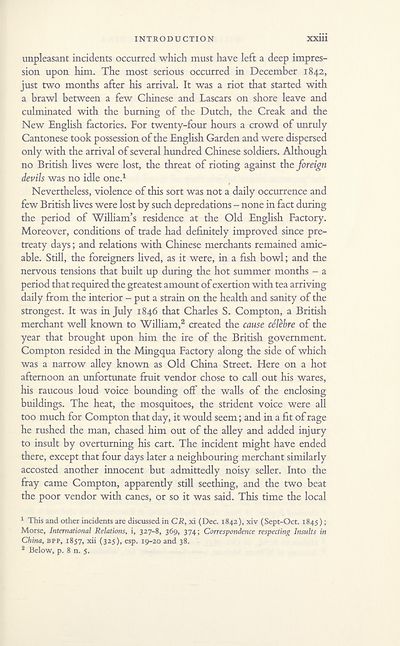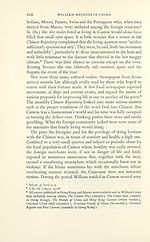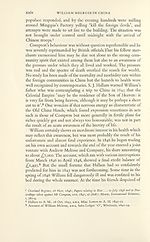Series 4 > William Melrose in China, 1845-1855
(28) Page xxiii
Download files
Complete book:
Individual page:
Thumbnail gallery: Grid view | List view

INTRODUCTION
xxiii
unpleasant incidents occurred which must have left a deep impres¬
sion upon him. The most serious occurred in December 1842,
just two months after his arrival. It was a riot that started with
a brawl between a few Chinese and Lascars on shore leave and
culminated with the burning of the Dutch, the Creak and the
New English factories. For twenty-four hours a crowd of unruly
Cantonese took possession of the English Garden and were dispersed
only with the arrival of several hundred Chinese soldiers. Although
no British lives were lost, the threat of rioting against the foreign
devils was no idle one.1
Nevertheless, violence of this sort was not a daily occurrence and
few British lives were lost by such depredations - none in fact during
the period of William’s residence at the Old English Factory.
Moreover, conditions of trade had definitely improved since pre¬
treaty days; and relations with Chinese merchants remained amic¬
able. Still, the foreigners lived, as it were, in a fish bowl; and the
nervous tensions that built up during the hot summer months - a
period that required the greatest amount of exertion with tea arriving
daily from the interior - put a strain on the health and sanity of the
strongest. It was in July 1846 that Charles S. Compton, a British
merchant well known to William,2 created the cause celebre of the
year that brought upon him the ire of the British government.
Compton resided in the Mingqua Factory along the side of which
was a narrow alley known as Old China Street. Here on a hot
afternoon an unfortunate fruit vendor chose to call out his wares,
his raucous loud voice bounding off the walls of the enclosing
buildings. The heat, the mosquitoes, the strident voice were all
too much for Compton that day, it would seem; and in a fit of rage
he rushed the man, chased him out of the alley and added injury
to insult by overturning his cart. The incident might have ended
there, except that four days later a neighbouring merchant similarly
accosted another innocent but admittedly noisy seller. Into the
fray came Compton, apparently still seething, and the two beat
the poor vendor with canes, or so it was said. This time the local
1 This and other incidents are discussed in CR, xi (Dec. 1842), xiv (Sept-Oct. 1845);
Morse, International Relations, i, 327-8, 369, 374; Correspondence respecting Insults in
China, bpp, 1857, xii (325), esp. 19-20 and 38.
2 Below, p. 8 n. 3.
xxiii
unpleasant incidents occurred which must have left a deep impres¬
sion upon him. The most serious occurred in December 1842,
just two months after his arrival. It was a riot that started with
a brawl between a few Chinese and Lascars on shore leave and
culminated with the burning of the Dutch, the Creak and the
New English factories. For twenty-four hours a crowd of unruly
Cantonese took possession of the English Garden and were dispersed
only with the arrival of several hundred Chinese soldiers. Although
no British lives were lost, the threat of rioting against the foreign
devils was no idle one.1
Nevertheless, violence of this sort was not a daily occurrence and
few British lives were lost by such depredations - none in fact during
the period of William’s residence at the Old English Factory.
Moreover, conditions of trade had definitely improved since pre¬
treaty days; and relations with Chinese merchants remained amic¬
able. Still, the foreigners lived, as it were, in a fish bowl; and the
nervous tensions that built up during the hot summer months - a
period that required the greatest amount of exertion with tea arriving
daily from the interior - put a strain on the health and sanity of the
strongest. It was in July 1846 that Charles S. Compton, a British
merchant well known to William,2 created the cause celebre of the
year that brought upon him the ire of the British government.
Compton resided in the Mingqua Factory along the side of which
was a narrow alley known as Old China Street. Here on a hot
afternoon an unfortunate fruit vendor chose to call out his wares,
his raucous loud voice bounding off the walls of the enclosing
buildings. The heat, the mosquitoes, the strident voice were all
too much for Compton that day, it would seem; and in a fit of rage
he rushed the man, chased him out of the alley and added injury
to insult by overturning his cart. The incident might have ended
there, except that four days later a neighbouring merchant similarly
accosted another innocent but admittedly noisy seller. Into the
fray came Compton, apparently still seething, and the two beat
the poor vendor with canes, or so it was said. This time the local
1 This and other incidents are discussed in CR, xi (Dec. 1842), xiv (Sept-Oct. 1845);
Morse, International Relations, i, 327-8, 369, 374; Correspondence respecting Insults in
China, bpp, 1857, xii (325), esp. 19-20 and 38.
2 Below, p. 8 n. 3.
Set display mode to:
![]() Universal Viewer |
Universal Viewer | ![]() Mirador |
Large image | Transcription
Mirador |
Large image | Transcription
Images and transcriptions on this page, including medium image downloads, may be used under the Creative Commons Attribution 4.0 International Licence unless otherwise stated. ![]()
| Scottish History Society volumes > Series 4 > William Melrose in China, 1845-1855 > (28) Page xxiii |
|---|
| Permanent URL | https://digital.nls.uk/127694913 |
|---|
| Description | Over 180 volumes, published by the Scottish History Society, containing original sources on Scotland's history and people. With a wide range of subjects, the books collectively cover all periods from the 12th to 20th centuries, and reflect changing trends in Scottish history. Sources are accompanied by scholarly interpretation, references and bibliographies. Volumes are usually published annually, and more digitised volumes will be added as they become available. |
|---|


